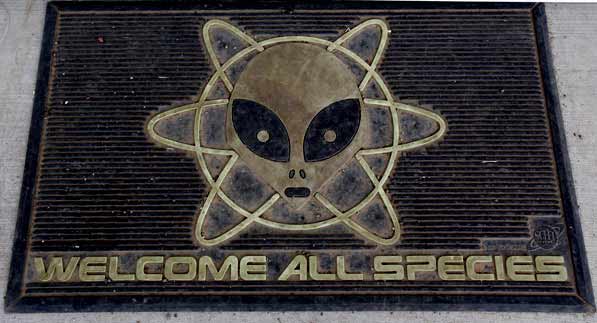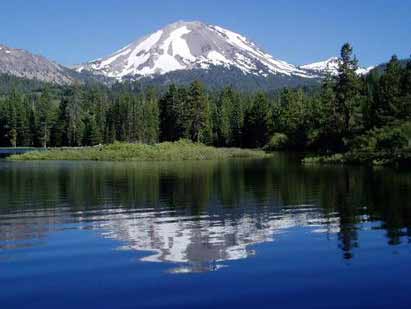

A Prior Trip here, Post-Trip Pictures
The class will be a concentrated weekend of field astronomy at Mt. Lassen Volcanic National Park. Mt. Lassen anchors the southern end of the Cascade Mountain Range. We'll explore planetary science by day, exploring the processes which dominate the geology of the inner planets and the Earth in particular.
 Saturday morning, if it's accessible, we'll tour the Allen Telescope Array - this is the array of radio telescopes designed to search for signals from extra-terrestrial intelligence on planets around stars in our corner of the Milky Way Galaxy. We were able to take a walk around the place so I could lecture, on our last visit there 8 years ago. I am hoping we can do so again In prior visits, we were able to get an informal tour by the astronomers there. I'm not sure if it will have astronomers active on our weekend, but we hope we can arrange this. .
Saturday morning, if it's accessible, we'll tour the Allen Telescope Array - this is the array of radio telescopes designed to search for signals from extra-terrestrial intelligence on planets around stars in our corner of the Milky Way Galaxy. We were able to take a walk around the place so I could lecture, on our last visit there 8 years ago. I am hoping we can do so again In prior visits, we were able to get an informal tour by the astronomers there. I'm not sure if it will have astronomers active on our weekend, but we hope we can arrange this. .
At night, we'll be camping near Mt. Lassen, but not inside the National Park. In the past, we've been at Hat Creek campground on Hat Creek, just outside Mt. Lassen National Park, and had exciting and memorable trips on our past Astro 28's here (Astro 28H in '03, and Astro 28P in '05, and Astro 28U in '09, and Kirk B's Flickr page from Astro 28U in '09, and Astro 28H again in 2012).We'll either be at Hat Creek Campground, or Cave Campground which has 16 individual sites which remain open year-round. It's right across from one of our most interesting sites to visit and do some micro-lectures: Subway Lava Tube, (and here) .
For Saturday afternoon, we'll drive I'm pondering perhaps hiking from the South Entrance station to Mill Creek Falls and hopefully beyond, to the geothermal areas of Cold Boiling Lake and Bumpass Hell. Here's the trail information.
Astronomical Highlights
The Perseid Meteor Shower peaks this weekend, and the moon is a small crescent - perfect for this most powerful of the regular meteor showers. There is also a lunar grazing occultation in the early morning sky nearby which we will plan to observer and record on video.
And, the summer Milky Way is rich with star formation regions, the bright core of our own Milky Way Galaxy rides high in the south, and we plan to have a number of telescopes to view through, while I give my micro-lectures on all things in astronomy.
Aug 3 Thur 6-9pm - We'll meet at room 705 and/or next door in 706 for our pre-trip logistics meeting, and first lectures on astronomy. Prime logistics to settle are distribution of maps, helping you get into carpools or the van. We will have two vans. One will be chock-full of telescope gear, kitchen gear, and other camp gear necessary for the group, as well as the group meals, and I'll be driving that van with my assistant. Meals: meals planning. Again, I strongly urge you to have me cook for you and buy your breakfasts and dinner food and prepare it for you. It really helps with group cohesiveness and provides a place for us all to learn and bond together! The 2nd van will be for students, but it can handle only up to 8 students. So, some of you will have to carpool. We'll provide the opportunity to help you meet each other and settle that. During our day explorations, both vans will be able to transport students. The SETI array is about a 15 minute drive from camp. Mt. Lassen is a little farther, in the other direction.
Friday night Aug 11 - meet at the Campground as soon as you can, hopefully by 5pm. If I can't reserve campsites ahead, then I really deeply sincerely hope we have at least one or two cars who want to arrive early, like Thursday, and grab campsites for us. I think 5 sites ought to be enough, or even just 4. We'll take what we can get. Sites are $10/night and there are no reservations possible, hence the desire for advance scouts. Any takers? Let me know soon, to relieve my anxiety!
I'll prepare dinner and we'll try to get that done and cleaned up soon after dark. Then, we'll have out the telescopes and conduct micro-lectures on the planets and objects of the Milky Way. If partly cloudy or mostly cloudy, we'll sit around the campfire (firewood, anyone? I can bring SOME) and I'll entertain with astro fascinating things, especially on the prospects for intelligent life in the universe. I'll bring the 10" computer-controlled Meade LX200 scope, and we're likely to have a 12" Dob as well, and if we're lucky, JP's 17" scope and his enthusiastic tours of the deep objects in the sky.
Saturday Aug 12: 8:30am - We'll have breakfast ready - my famous French Crepes breakfast! Bring your own utensils and save waste and trees. We'll then carpool about 12 miles to the SETI telescope site and tour the grounds, examine the spooky telescopes, and learn about how SETI is searching for ET's, and the prospects for discovery of ET's. We'll be done and can do a stop back at the campground to pick up your lunches (lunch, remember, and any snacks, are yours to bring. I won't supply these), and we'll then continue on and enter Lassen National Park (map and current road conditions, and snow coverage for California database), and hike around one of the lakes, have mico-lectures on planetary science and volcanism in the solar system as we work our way towards Bumpass Hell's boiling  fumaroles by late in the day. Study up on the geothermals of Lassen here. We expect scenes like at left. With bad luck, maybe like this. Saturday night we'll cook a group dinner, and then settle in for a night under the stars observing and lecturing on the evolution of stars from birth to death, study Saturn and Mars in the telescope as well as the many objects making up the Milky Way
fumaroles by late in the day. Study up on the geothermals of Lassen here. We expect scenes like at left. With bad luck, maybe like this. Saturday night we'll cook a group dinner, and then settle in for a night under the stars observing and lecturing on the evolution of stars from birth to death, study Saturn and Mars in the telescope as well as the many objects making up the Milky Way  Galaxy. We'll have giant 12" and maybe even a 17" Dobsonian telescopes, and an 8" Celestron SC telescope for planetary nebulae and the evening planets Venus, Mars, and Jupiter..
Galaxy. We'll have giant 12" and maybe even a 17" Dobsonian telescopes, and an 8" Celestron SC telescope for planetary nebulae and the evening planets Venus, Mars, and Jupiter..
Sunday: 8:30am: I'll cook you a breakfast of scrambled eggs, and spuds 'n' veges, then head to Subway lava tube, one of the largest and most famous of these strange structures in the world, and continue our lectures of the formation of the Cascades and comparison with volcanics on other planets like Mercury, Mars, and Titan.
Field Notes on Planetary Geology (if your Firefox browser shows funny black diamonds scattered around, then at the top of your Firefox browser window click on view | character encoding | and change to "western") Here's another version of my notes on Planetary Processes.
|
The group campsite we used at Hat Creek in 2009. |
The class will be a "go" regardless of weather. However, August weather is usually great. These days, however, there's another danger and that is wildfires. That may force a change of location at the last minute. For now, we'll assume the best.
Rules, Grading, SLO's, Students with Disabilities
Final note is that I'll be messaging you through Canvas, right up to the day we take off. So, do check your email regularly as we get close, and be SURE to be at the pre-trip meeting - important information and logistics will be happening there.
Student Learner Outcomes
1. Infer the volcanic processes which produce the various landforms at an active volcano, and contrast with planetary landforms on the other inner planets.
2. Compare optical and radio telescopes and connect how and why the SETI Project looks for signals from extra-terrestrial civilizations via radio astronomy technology.